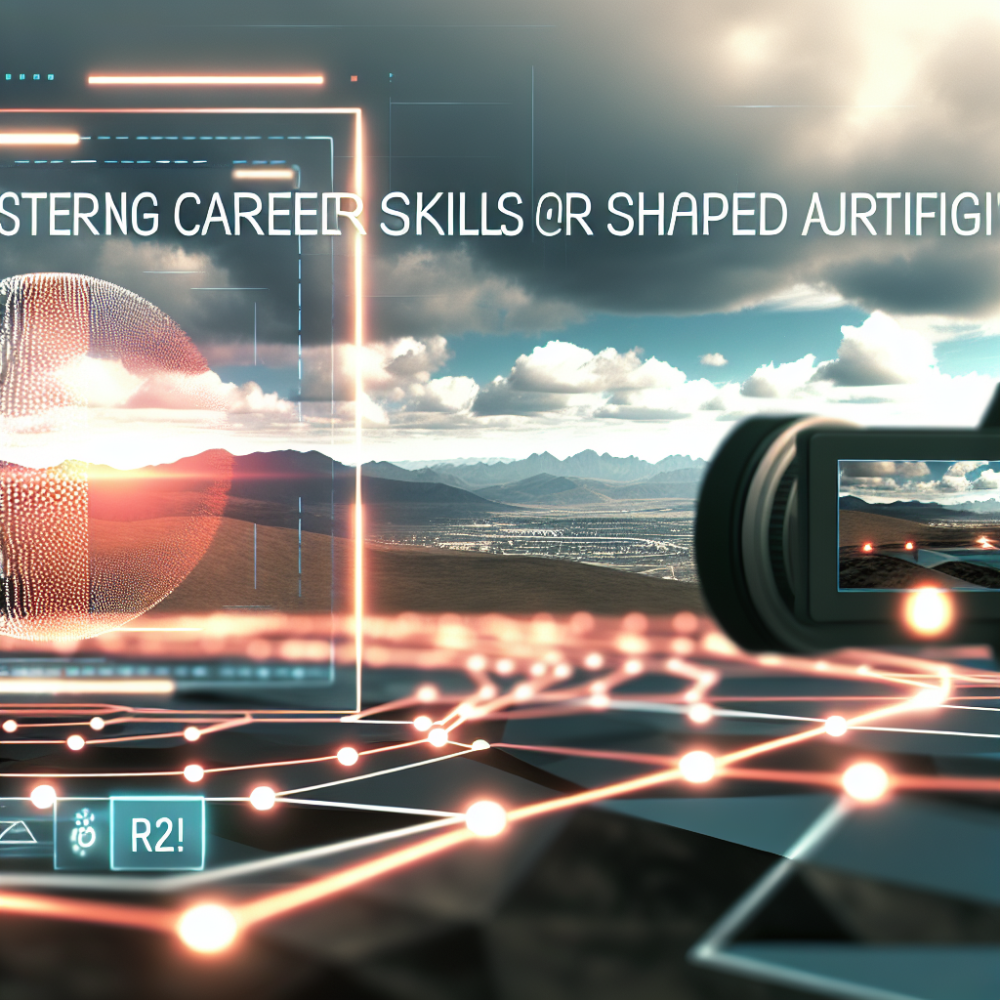The Importance of Continuous Learning in the AI Era
The rapid advancement of artificial intelligence (AI) has brought about significant changes in the job market. As AI technology continues to evolve, it is becoming increasingly important for individuals to continuously update and master their career skills to stay relevant in the AI era. Continuous learning has always been crucial for professional growth, but in the AI era, it has become an absolute necessity.
One of the main reasons why continuous learning is essential in the AI era is the ever-changing nature of technology. AI is constantly evolving, and new tools and techniques are being developed at a rapid pace. To keep up with these advancements, professionals need to stay updated and continuously learn new skills. This not only helps them stay relevant in their current roles but also opens up new opportunities for career growth.
Moreover, continuous learning is crucial in the AI era because it helps individuals adapt to the changing job market. With the rise of AI, many traditional jobs are being automated, and new roles are emerging. By continuously learning and acquiring new skills, professionals can position themselves for these new job opportunities. They can learn how to work alongside AI systems, leverage AI tools to enhance their productivity, or even transition into entirely new AI-related roles. Continuous learning allows individuals to stay ahead of the curve and remain competitive in the job market.
In addition to adapting to the changing job market, continuous learning also enables professionals to enhance their problem-solving and critical thinking skills. AI technology is designed to automate routine tasks, leaving humans to focus on more complex and strategic work. To excel in such roles, individuals need to develop strong problem-solving and critical thinking abilities. Continuous learning provides opportunities to acquire and refine these skills through various training programs, workshops, and online courses. By continuously learning, professionals can sharpen their analytical skills and become more effective problem solvers, making them valuable assets in the AI era.
Furthermore, continuous learning helps professionals stay agile and adaptable in their careers. The AI era is characterized by rapid technological advancements and disruptions. Jobs that exist today may become obsolete in the near future, and new roles may emerge. By continuously learning, professionals can develop a growth mindset and become more adaptable to change. They can quickly acquire new skills and pivot their careers when necessary. Continuous learning fosters a sense of resilience and empowers individuals to navigate the uncertainties of the AI era with confidence.
In conclusion, continuous learning is of utmost importance in the AI era. It allows professionals to stay updated with the ever-changing technology landscape, adapt to the changing job market, enhance problem-solving and critical thinking skills, and remain agile and adaptable in their careers. The AI era presents both challenges and opportunities, and continuous learning is the key to mastering career skills for an AI future. By embracing continuous learning, professionals can position themselves for success and thrive in the AI era.
Developing Technical Skills for a Successful AI Career
Developing Technical Skills for a Successful AI Career
In today’s rapidly evolving world, artificial intelligence (AI) has become an integral part of various industries. From healthcare to finance, AI is transforming the way we work and live. As AI continues to advance, it is crucial for professionals to develop the necessary technical skills to thrive in this AI-driven future.
One of the fundamental technical skills required for a successful AI career is programming. Proficiency in programming languages such as Python, R, and Java is essential for developing AI algorithms and models. Python, in particular, is widely used in the AI community due to its simplicity and extensive libraries for machine learning and data analysis. By mastering programming languages, individuals can effectively implement AI solutions and contribute to the development of cutting-edge technologies.
Another crucial skill for an AI career is data analysis. AI heavily relies on data, and the ability to analyze and interpret large datasets is vital. Professionals need to be proficient in statistical analysis, data visualization, and data preprocessing techniques. These skills enable them to extract meaningful insights from complex data, which can then be used to train AI models and make informed decisions. Moreover, understanding data ethics and privacy is becoming increasingly important as AI systems handle sensitive information. Professionals must ensure that data is handled responsibly and ethically throughout the AI development process.
Machine learning is at the core of AI, and having a solid understanding of its principles is essential. Professionals should be familiar with various machine learning algorithms, such as linear regression, decision trees, and neural networks. They should also know how to evaluate and fine-tune these models to achieve optimal performance. Additionally, knowledge of deep learning, a subset of machine learning that focuses on neural networks, is becoming increasingly valuable in the AI field. By mastering machine learning techniques, professionals can develop AI systems that can learn from data and make accurate predictions or decisions.
To stay ahead in the AI industry, professionals must also keep up with the latest advancements and trends. AI is a rapidly evolving field, and new techniques and technologies emerge regularly. Continuous learning and staying updated with the latest research papers, conferences, and online courses are crucial for career growth. Additionally, participating in AI competitions and collaborating with other professionals in the field can provide valuable learning opportunities and help individuals stay at the forefront of AI innovation.
In addition to technical skills, professionals should also develop soft skills that are essential for a successful AI career. Effective communication and collaboration skills are crucial for working in interdisciplinary teams and conveying complex AI concepts to non-technical stakeholders. Problem-solving and critical thinking skills are also vital for tackling AI challenges and developing innovative solutions. Furthermore, having a strong ethical foundation and understanding the societal impact of AI is essential for responsible AI development.
In conclusion, developing technical skills is crucial for a successful AI career in today’s AI-driven world. Proficiency in programming, data analysis, and machine learning is essential for developing AI solutions and contributing to the advancement of the field. Staying updated with the latest advancements and trends, as well as developing soft skills, are equally important for career growth. By mastering these skills, professionals can position themselves for a rewarding and impactful career in the AI industry.
Mastering Soft Skills for Effective Collaboration in AI Teams
Mastering Soft Skills for Effective Collaboration in AI Teams
In today’s rapidly evolving world, artificial intelligence (AI) has become an integral part of various industries. As AI continues to advance, professionals must develop the necessary skills to thrive in this AI-driven future. While technical expertise is undoubtedly important, mastering soft skills is equally essential, especially when it comes to effective collaboration in AI teams.
One of the most critical soft skills for successful collaboration in AI teams is communication. Clear and concise communication is vital to ensure that team members understand each other’s ideas and goals. In the context of AI, where complex algorithms and models are involved, effective communication becomes even more crucial. Team members must be able to explain their ideas and concepts in a way that is easily understandable to both technical and non-technical stakeholders.
Furthermore, active listening is an essential component of effective communication. AI teams often consist of individuals with diverse backgrounds and expertise. By actively listening to each other, team members can gain a deeper understanding of different perspectives and ideas. This not only fosters a collaborative environment but also enhances the quality of the team’s work.
Another crucial soft skill for effective collaboration in AI teams is adaptability. The field of AI is constantly evolving, with new technologies and methodologies emerging regularly. As a result, team members must be adaptable and open to learning new skills and techniques. This adaptability allows AI teams to stay ahead of the curve and continuously improve their work.
Moreover, problem-solving skills are indispensable in the AI field. AI projects often involve complex challenges that require innovative solutions. By developing strong problem-solving skills, team members can tackle these challenges head-on and find creative ways to overcome them. This skill is particularly valuable in AI teams, where finding solutions to intricate problems can significantly impact the success of a project.
Collaboration and teamwork are also essential soft skills for AI professionals. AI projects are rarely accomplished by a single individual; they require the collective effort of a team. Effective collaboration involves working together towards a common goal, leveraging each team member’s strengths and expertise. By fostering a collaborative environment, AI teams can maximize their potential and achieve outstanding results.
Furthermore, emotional intelligence plays a significant role in effective collaboration within AI teams. Emotional intelligence encompasses the ability to understand and manage one’s emotions and empathize with others. In the context of AI teams, emotional intelligence allows team members to navigate conflicts, build strong relationships, and foster a positive work environment. This skill is particularly important in high-pressure situations, where emotions can run high.
Lastly, time management and organization skills are crucial for AI professionals. AI projects often have strict deadlines and require meticulous planning and organization. By mastering time management skills, team members can ensure that tasks are completed efficiently and on schedule. Additionally, being organized allows AI professionals to keep track of project details, data, and resources, ensuring that nothing falls through the cracks.
In conclusion, mastering soft skills is essential for effective collaboration in AI teams. Communication, adaptability, problem-solving, collaboration, emotional intelligence, and time management are all critical skills that AI professionals should develop. By honing these skills, AI teams can work together seamlessly, overcome challenges, and achieve remarkable results in the AI-driven future.
Navigating Ethical Challenges in the AI Industry
Navigating Ethical Challenges in the AI Industry
As artificial intelligence (AI) continues to advance at an unprecedented pace, it is crucial for professionals to master the necessary career skills to navigate the ethical challenges that arise in this rapidly evolving industry. With AI becoming increasingly integrated into various aspects of our lives, from healthcare to finance, it is essential to ensure that its development and deployment align with ethical principles.
One of the key ethical challenges in the AI industry is the potential for bias in algorithms. AI systems are trained on vast amounts of data, and if that data is biased, the algorithms can perpetuate and amplify those biases. This can lead to discriminatory outcomes, such as biased hiring practices or unfair treatment in criminal justice systems. To address this challenge, professionals in the AI industry must develop a deep understanding of the data they are working with and actively work to identify and mitigate biases.
Transparency is another crucial aspect of navigating ethical challenges in the AI industry. Many AI systems operate as black boxes, making it difficult to understand how they arrive at their decisions. This lack of transparency can lead to distrust and concerns about accountability. Professionals in the AI industry must advocate for transparency and work towards developing explainable AI systems that can provide clear explanations for their decisions. This will not only help build trust but also enable individuals to challenge and correct any biases or errors in the system.
Privacy and data protection are also significant ethical challenges in the AI industry. AI systems often rely on vast amounts of personal data to function effectively. However, the collection and use of this data raise concerns about privacy and the potential for misuse. Professionals in the AI industry must prioritize privacy and data protection by implementing robust security measures, obtaining informed consent from individuals, and ensuring that data is used only for its intended purpose. Additionally, they should actively engage in discussions around data governance and advocate for policies that protect individuals’ privacy rights.
Another ethical challenge in the AI industry is the potential for job displacement. As AI technology advances, there is a growing concern that it will replace human workers, leading to unemployment and economic inequality. Professionals in the AI industry must consider the social and economic implications of their work and actively work towards developing AI systems that augment human capabilities rather than replacing them. This may involve retraining and upskilling workers to adapt to the changing job market and ensuring that the benefits of AI are distributed equitably.
Lastly, professionals in the AI industry must also grapple with the ethical implications of autonomous systems. As AI becomes more autonomous, there are concerns about the potential for AI systems to make decisions that have significant consequences, such as in autonomous vehicles or healthcare. It is crucial for professionals in the AI industry to develop frameworks and guidelines for responsible AI deployment, ensuring that these systems are designed to prioritize human safety and well-being.
In conclusion, mastering career skills for an AI future requires professionals in the industry to navigate the ethical challenges that arise. From addressing bias in algorithms to advocating for transparency and privacy, professionals must actively engage in discussions and actions that promote ethical AI development and deployment. By doing so, they can help shape an AI future that is fair, accountable, and beneficial for all.







Leave a Reply
You must be logged in to post a comment.